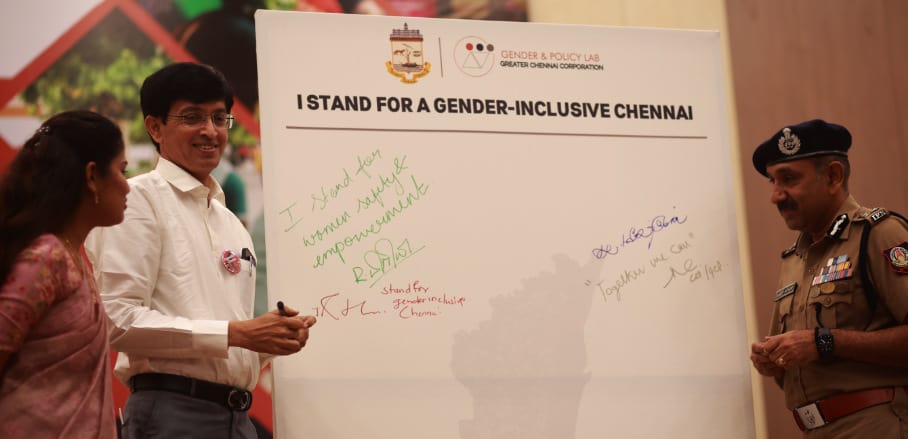How to Make Cities Safer Spaces for Everyone
Cities are not built for women. In Chennai, the Gender and Policy Lab works on transforming the cityscape as well as public transport into safer places based on gender-specific needs. By Meera Sundararajan
Tamil Nadu is the third most urbanised state in India with nearly half of its population living in urban areas. The city of Chennai is an important employment and educational destination within the state. However, cities and transportation infrastructure are traditionally built based on the able-bodied male’s needs rather than creating easily accessible and safe public spaces for all inhabitants.
Women, for instance, often have to negotiate the city through spaces that have not been created according to their specific needs. As a result, policymakers are increasingly focusing on gender-inclusive urban planning.
The Gender and Policy Lab was established in February 2022 and is located within the Greater Chennai Corporation as part of the World Bank Supported Chennai City Partnership project. The lab is supported by the Nirbhaya fund which was set up to protect the dignity and ensure the safety of women in India in the memory of a young woman, who was assaulted inside a moving bus in New Delhi in December 2012.
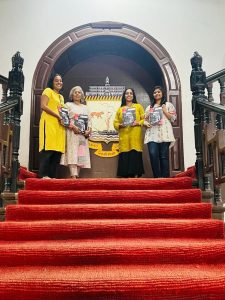
The Gender and Policy Lab team
The Gender and Policy Lab aims to enhance women’s access to opportunities by improving safety and gender responsiveness in public spaces and public transport through a multi-pronged collaborative approach. Furthermore, the lab works on mainstreaming gender inclusivity so that it becomes a process and a natural element in all city-level planning and service delivery decisions.
High Crime Rates Against Women in Chennai
In 2021, the crime rate against women in Tamil Nadu lies at 22.23 for a female population of 100.000, which accounts for one-third of the crime rate for the country. Even though ten per cent of the crimes against women in Tamil Nadu have taken place in Chennai, women are not invisible entities within the city. Schemes like free bus travel on state-run buses for women, a safety app developed by the police called “Kavalan Uthaivi” as well as the Department of Social Welfare’s helpline 181 have demonstrated the importance of safety and mobility for women and girls. However, social norms still come in the way of reporting crimes like harassment in public spaces, and general public apathy when such crimes take place is troubling.
To address these issues, the Gender and Policy lab got to work in various areas over the last two years. It started off with some studies to assess the ground situation. A city-wide perception study on women’s safety and mobility covering 2.400 women, 500 men and 100 trans persons gathered data through surveys in households, public spaces, and transport junctions along with a qualitative component to understanding the issues on a deeper level.
Public Spaces Are Perceived as Unsafe
Findings indicate that 89 per cent of women in the city travel by bus with work as the main objective for travel followed by education. On an average women in Chennai travel a distance of 5.8 kilometres during 5 days a week for work and 3.6 km for education. Responses also highlighted that certain public spaces were perceived as unsafe. While the affordability of the buses was considered to be good – bus travel for the non-deluxe category of buses in the state is free for women and trans persons – there were concerns about their frequency and last-mile connectivity. Although less than 20 per cent of women reported that they faced harassment in public spaces, the lack of any bystander interventions came across as a matter of concern.
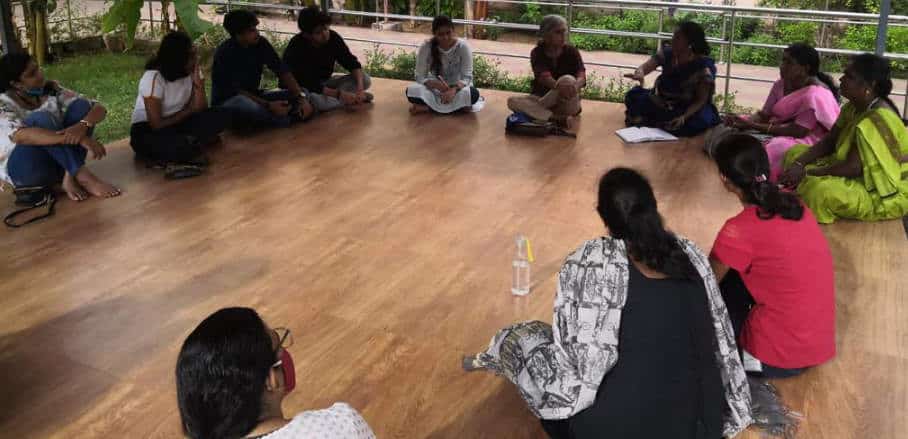
Public consultations aim to figure out what park users want and need.
In addition, the lab undertook a safety audit of 46 locations in the city. The exercise was carried out with 22 citizens who were provided with a fellowship and trained on safety audit processes. The audit covered bus stops, approach roads, metro stations, and suburban train stations in the city. The findings were presented to representatives from the police, the Metropolitan Transport Corporation, the Greater Chennai Corporation, and the Railway Protection Force. Diligent follow-up helped address the gaps in terms of street lighting, and public toilets, as well as concerns related to bus stops, terminus, and railway stations.
Building up Gender Sensitivity
Furthermore, training programmes to build capacities involve building up gender sensitivity among school children. The Greater Chennai Corporation runs around 400 schools in the city and extended areas. The Gender and Policy Lab has been anchoring a programme called the Gender Club that was established in August 2022 and covers children in 8th and 9th grade in 70 high and higher secondary schools as well as in 8th grade in 92 middle schools.
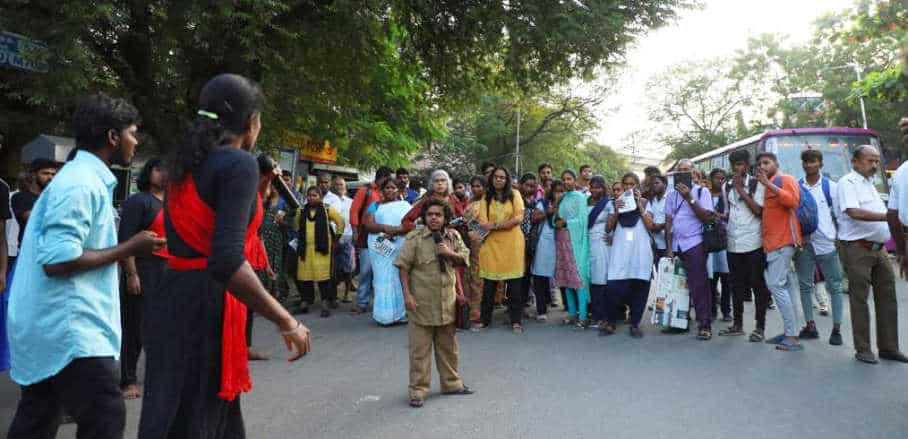
Street theatre campaigns at bus stations
This programme conducted twice a month includes activity-based learning on topics related to gender for both boys and girls. The Gender and Policy Lab has developed resource material and trained the teachers to conduct the club activities. The middle school programme is undergoing evaluation with initial findings suggesting that it has encouraged boys and girls to interact more and created a feeling of camaraderie.
Moreover, within a workshop on gender and disabilities conducted with the National Institute of Urban Affairs trained engineers from different government departments and smart city projects in Southern India discussed why and how to build accessible infrastructure.
What Does the Government Do to Address Safety Issues?
The Gender and Policy Lab team then looked closely at the gender usage of civic infrastructure such as parks and mobility infrastructure like bus stops. Interactions with park users and online surveys have provided data on how to make the parks more welcoming and enabling for women. Similar recommendations based on reviewing existing designs of bus stops across the city have helped in coming up with recommendations on gender-inclusive designs. These have been shared for inclusion in the design specifications for the upcoming procurements on bus shelters and building new parks.
Setting up an interdepartmental working group with stakeholder departments like the Police, Chennai Metropolitan Development Authority, Social Welfare, and Chennai Metro Rail is seeking to converge all government efforts to address women’s safety and mobility. Meanwhile, engagement with civil society has helped in getting the perspectives from the ground.
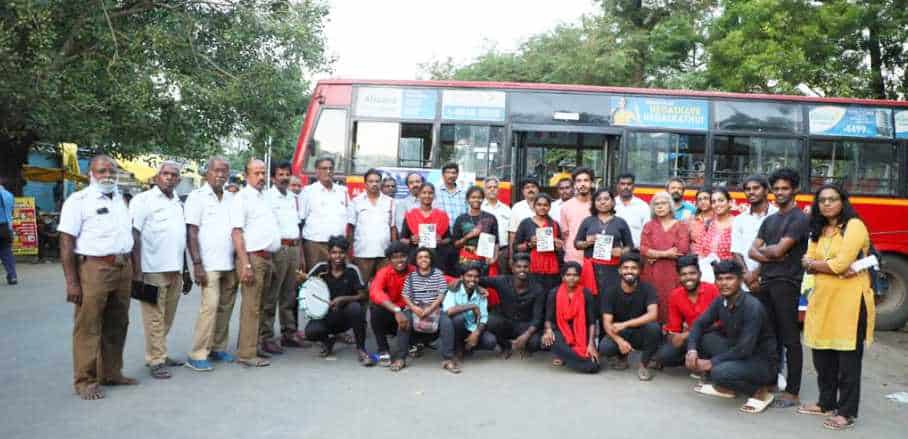
The Gender and Policy lab team along with the city’s metropolitan transport staff
Campaigns on women’s presence in public spaces after dark and social media campaigns initiated through the government resulted in other department heads pledging to ensure women’s safety and building public awareness on the issue of women’s safety and mobility.
A Manual on Gender-Responsive Urban Planning
In the upcoming months, the team will be looking deeper into the issue of women’s mobility through a study of bus routes with a maximum number of female passengers. Additionally, the lab plans on drafting a manual on gender-responsive urban planning that would be used for building awareness on how cities can be built in a gender-inclusive manner. Finally, the lab will conduct a campaign on bystander intervention as well as a grassroots-level training programme to coach youth and community members to become champions for women’s safety.
By collecting data through studies and using the experiences from project implementation, the Gender and Policy Lab aims to lay the ground for a robust policy to guarantee safe access and mobility for women in the city.
- How to Make Cities Safer Spaces for Everyone - 7. March 2024
